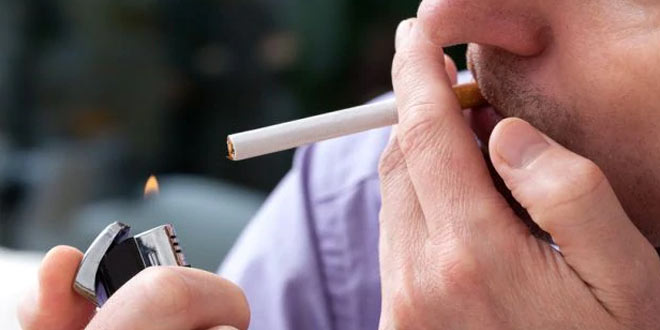Highlights
- Smoking may have resulted in more severe COVID-19 infection: Researchers
- Smoking reduces body's natural defenses against viruses: Expert
- Smoking negatively affect the immune system, says the new study
Los Angeles: Using lab-grown lung tissue, scientists have pinpointed how smoking cigarettes facilitates more severe lung infection by the novel coronavirus, an advance that may lead to new therapeutic strategies to help reduce smokers’ chances of developing severe COVID-19. According to the researchers, including those from the University of California Los Angeles (UCLA) in the US, the findings also shed more light on the COVID-19 risks for smokers. While several studies of COVID-19 patients have indicated that current smokers are at increased risk of severe infection and death due to the coronavirus infection, they said the reasons have not been entirely clear.
In the current research, published in the journal Cell Stem Cell, the scientists recreated what happens when the airways of a current smoker are infected with the novel coronavirus SARS-CoV-2. The researchers utilised a platform known as an air-liquid interface culture, which is grown from unspecialised cells called human airway stem cells, and closely replicated how these behave and function in humans.
The airways, which carry air breathed in from the nose and mouth to the lungs, are the body’s first line of defense against airborne pathogens like viruses, bacteria and smoke, the scientists said.
Our model replicates the upper part of the airways, which is the first place the virus hits. This is the part that produces mucus to trap viruses, bacteria and toxins and contains cells with finger-like projections that beat that mucus up and out of the body, said Brigitte Gomperts, a co-author of the study from UCLA.
Since these stem cells were taken from the lungs of healthy, non-smoking tissue donors, the researchers replicated the effects of smoking by exposing the airway cultures to cigarette smoke for three minutes per day over four days.
Also Read: Spell Of Heavy Smog In Indian Capital Raises Fears For COVID-19 Patients
This type of model has been used to study lung diseases for over a decade and has been shown to mimic the changes in the airway that you would see in a person who currently smokes, Mr. Gomperts explained.
The researchers then infected the cultures exposed to cigarette smoke — along with identical cultures that had not been exposed — with live SARS-CoV-2 virus and compared the two groups. In the models exposed to smoke, the scientists reported between two and three times more infected cells.
According to the researchers, smoking may have resulted in more severe SARS-CoV-2 infection, at least in part, by blocking the activity of immune system messenger proteins called interferons. They said interferons play a critical role in the body’s early immune response by triggering infected cells to produce proteins to attack the virus, summoning additional support from the immune system, and alerting uninfected cells to prepare to fight the virus.
If you think of the airways like the high walls that protect a castle, smoking cigarettes is like creating holes in these walls. Smoking reduces the natural defenses and that allows the virus to set in, Ms. Gomperts said.
(Except for the headline, this story has not been edited by NDTV staff and is published from a syndicated feed.)
NDTV – Dettol Banega Swasth India campaign is an extension of the five-year-old Banega Swachh India initiative helmed by Campaign Ambassador Amitabh Bachchan. It aims to spread awareness about critical health issues facing the country. In wake of the current COVID-19 pandemic, the need for WASH (Water, Sanitation and Hygiene) is reaffirmed as handwashing is one of the ways to prevent Coronavirus infection and other diseases. The campaign highlights the importance of nutrition and healthcare for women and children to prevent maternal and child mortality, fight malnutrition, stunting, wasting, anaemia and disease prevention through vaccines. Importance of programmes like Public Distribution System (PDS), Mid-day Meal Scheme, POSHAN Abhiyan and the role of Aganwadis and ASHA workers are also covered. Only a Swachh or clean India where toilets are used and open defecation free (ODF) status achieved as part of the Swachh Bharat Abhiyan launched by Prime Minister Narendra Modi in 2014, can eradicate diseases like diahorrea and become a Swasth or healthy India. The campaign will continue to cover issues like air pollution, waste management, plastic ban, manual scavenging and sanitation workers and menstrual hygiene.
[corona_data_new]



















